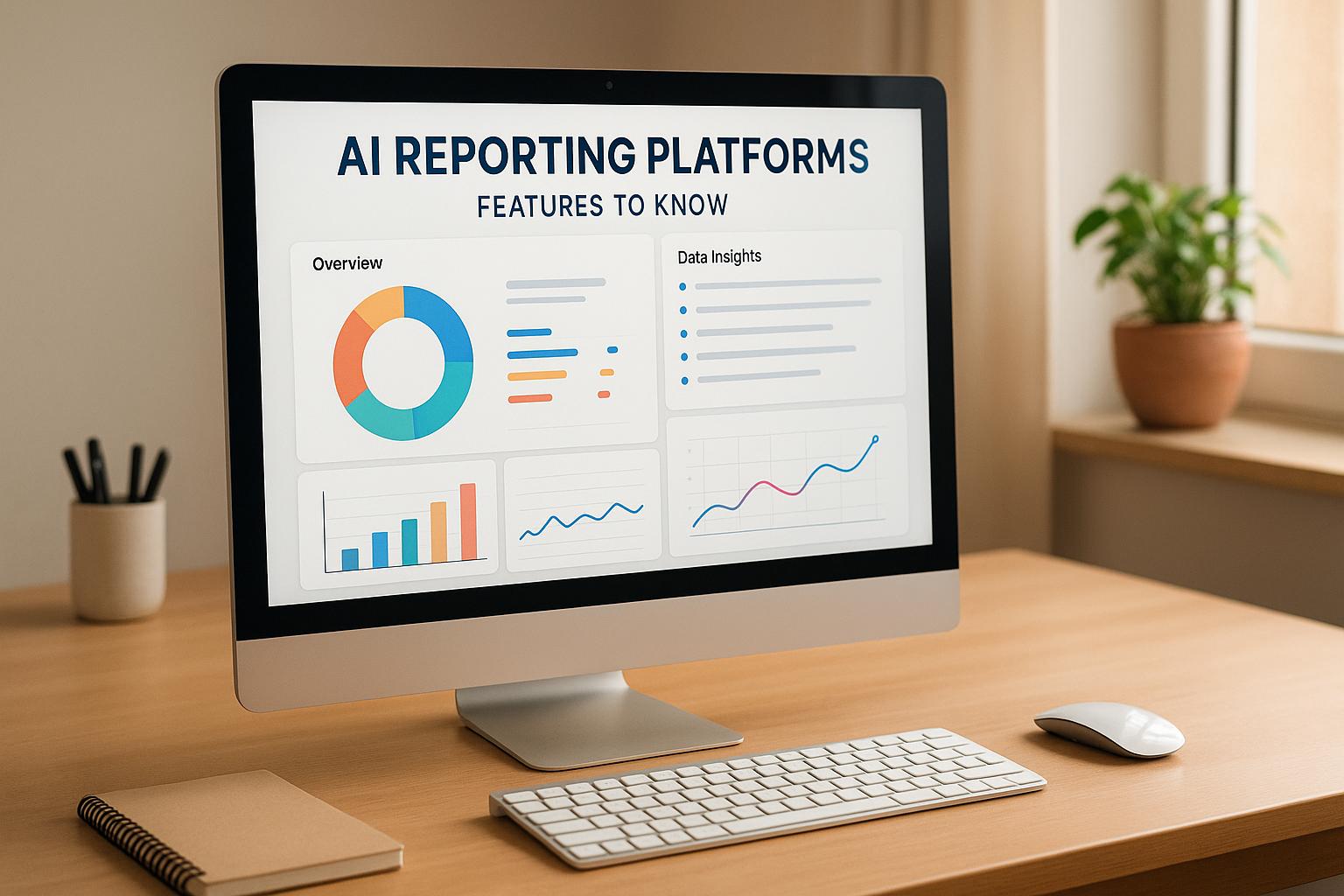In 2025, managing marketing data across multiple platforms is a major challenge for businesses. AI-powered reporting platforms simplify this process by automating data collection, standardizing metrics, and offering actionable insights. These tools save time, reduce errors, and improve decision-making by providing unified dashboards, predictive analytics, and optimization suggestions.
Here’s a quick overview of six leading platforms:
- Whatagraph: Best for agencies managing multiple clients; offers AI summaries, white-label dashboards, and fast support.
- AgencyAnalytics: Ideal for PPC/SEO-focused agencies; integrates with 80+ data sources and includes AI-driven tools like "Ask AI."
- Growify: Flexible for in-house teams and agencies; automates reporting and provides optimization suggestions.
- HubSpot Marketing Hub: Combines CRM and analytics for inbound marketing teams; includes predictive features and robust integrations.
- Zoho Analytics: Affordable option for small businesses; integrates with 250+ tools and offers strong visualization capabilities.
- Akkio: User-friendly for non-technical teams; focuses on predictive analytics and quick insights.
Quick Comparison:
| Platform | Key Strengths | Best For | Starting Price (Monthly) |
|---|---|---|---|
| Whatagraph | AI summaries, white-label dashboards | Medium-large agencies | Custom pricing |
| AgencyAnalytics | PPC/SEO focus, "Ask AI" feature | Small-mid-sized agencies | $12 per client campaign |
| Growify | Automated reporting, optimization | Agencies/in-house teams | $49 |
| HubSpot | CRM integration, predictive tools | Inbound marketing teams | $20 |
| Zoho Analytics | Affordable, strong visualizations | Small businesses | $25 |
| Akkio | No-code interface, predictive AI | Teams needing fast insights | $49 |
Each platform has unique strengths, so the right choice depends on your business size, goals, and budget. Test free trials to see which one fits your needs.
Make a Marketing Report with AI Tools - Easy Tutorial 2024
1. Whatagraph

Whatagraph is a marketing intelligence and reporting platform built to help agencies effortlessly consolidate data from multiple channels.
Automated Data Integration
One of Whatagraph's standout features is its ability to connect to multiple data sources with just a few clicks, automating the entire data transfer process. It organizes and standardizes information from various marketing channels using tools like data blends, custom metrics, and dimensions - all without requiring any coding. This automation is a game-changer for agencies managing multiple client accounts, enabling them to create detailed reports while cutting down on time and minimizing errors. This streamlined integration lays the groundwork for building highly personalized, branded dashboards.
Customizable Dashboards
Whatagraph makes creating dashboards and reports incredibly simple with drag-and-drop widgets and pre-designed templates. Agencies can fully customize these dashboards by adding their own logos, domains, and color schemes. Reports are easy to share, too - they can be sent as live links, PDFs, Excel files, or even automated emails. For advanced analysis, data can also be exported to tools like BigQuery and Looker Studio.
AI-Powered Insights
Whatagraph takes data interpretation a step further with its AI capabilities. The platform's AI chatbot simplifies KPI analysis by delivering quick performance summaries, identifying trends, and offering actionable insights. These AI-generated summaries make performance dashboards more effective, allowing marketers to focus on strategic decisions rather than spending hours on manual data processing.
US-Specific Localization
For agencies in the US, Whatagraph tailors its platform to meet local standards, including USD currency, MM/DD/YYYY date formats, imperial units, and appropriate number formatting. It also provides live chat and email support, with response times typically under a minute, and assigns each client a dedicated Customer Success Manager. The platform uses a custom pricing model based on the number of data source credits and feature access, offering flexibility for larger agencies. However, this pricing approach might be less ideal for smaller teams or solo marketers.
2. AgencyAnalytics
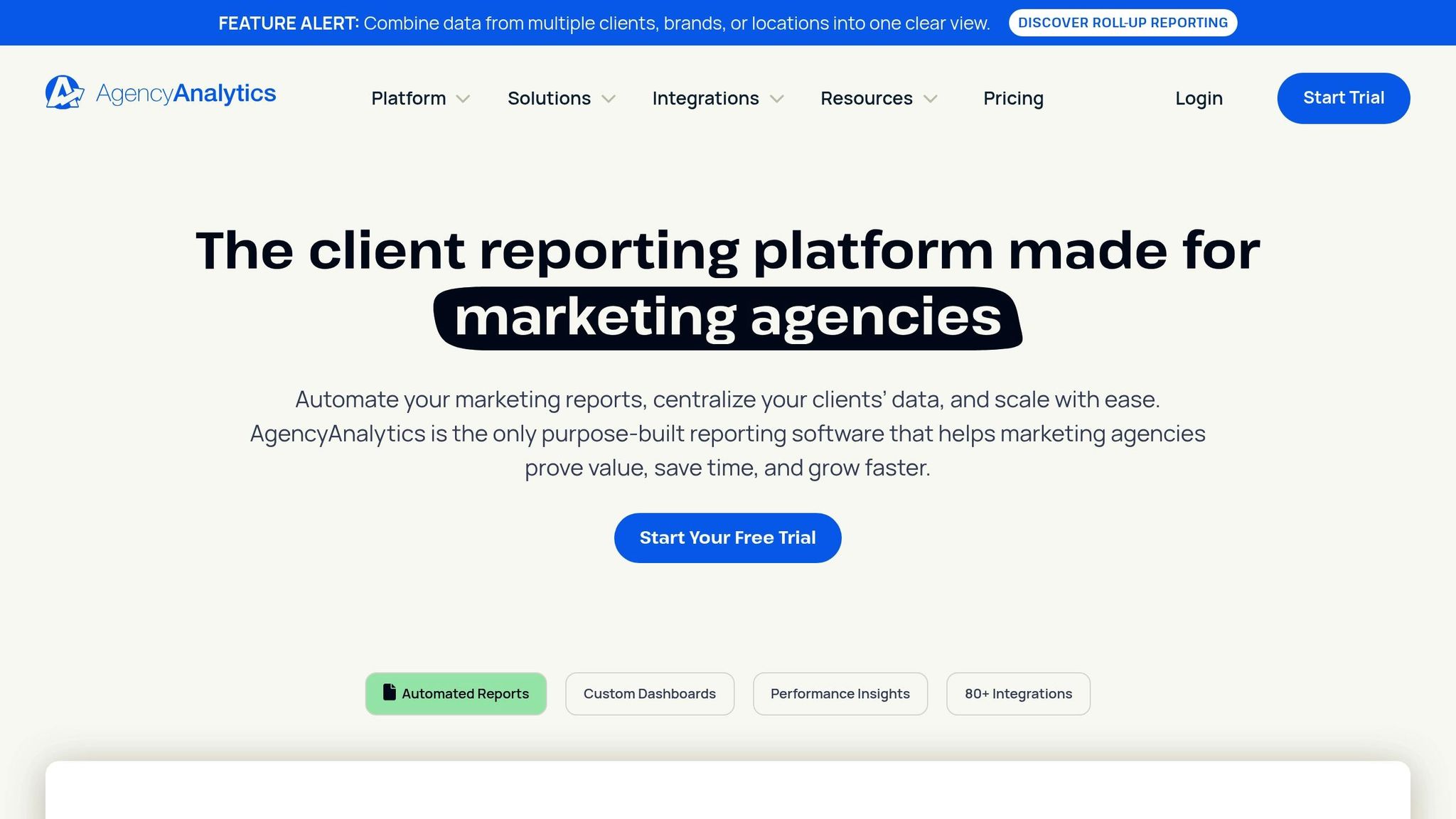
AgencyAnalytics is a reporting platform designed for small to mid-sized agencies looking to simplify their monitoring processes. It specializes in PPC and SEO marketing, making it a great choice for agencies focused on delivering data-driven reports without needing advanced technical skills. Its emphasis on core digital marketing channels ensures seamless data integration and reporting.
Automated Data Integration
With connections to over 80 data sources - including Google Analytics 4, Google Ads, Facebook, Instagram, Shopify, and LinkedIn - AgencyAnalytics automates the process of collecting campaign data. This automation saves agencies an estimated 5–10 hours per week, eliminating the need for manual data compilation and making it easier to manage multiple client accounts.
Customizable Dashboards
AgencyAnalytics lets users create custom dashboards tailored to their clients' needs. Agencies can adjust logos, colors, and domains through white-label options and schedule automated report deliveries. The platform’s flexibility in KPI selection allows users to highlight the most relevant metrics for each client.
AI-Powered Features
The platform includes two standout AI-driven tools: Ask AI and AI Widget Summaries. Ask AI allows users to explore specific dashboard sections or widgets by asking custom questions or using prompts like "Identify an opportunity." Meanwhile, AI Widget Summaries provide contextual summaries for charts and graphs, offering actionable insights for reports. However, users must regenerate summaries to reflect updated data.
US-Focused Design
AgencyAnalytics caters specifically to US-based marketing agencies. Reports follow American formatting standards, such as displaying dollar signs ($), using the MM/DD/YYYY date format, and applying comma-separated thousands for numbers. The platform integrates seamlessly with major US marketing tools, adjusts to local time zones, and complies with US data privacy regulations. These features make it a strong fit for agencies operating in the United States' data-centric marketing environment.
With an average rating of 4.7/5 on G2 and Capterra, AgencyAnalytics is praised for its user-friendly interface, extensive integrations, and reliable customer support. By 2025, it serves over 6,500 agencies globally, with pricing starting at $12 per month per client campaign for freelancers and $18 per month per client campaign for agencies.
3. Growify
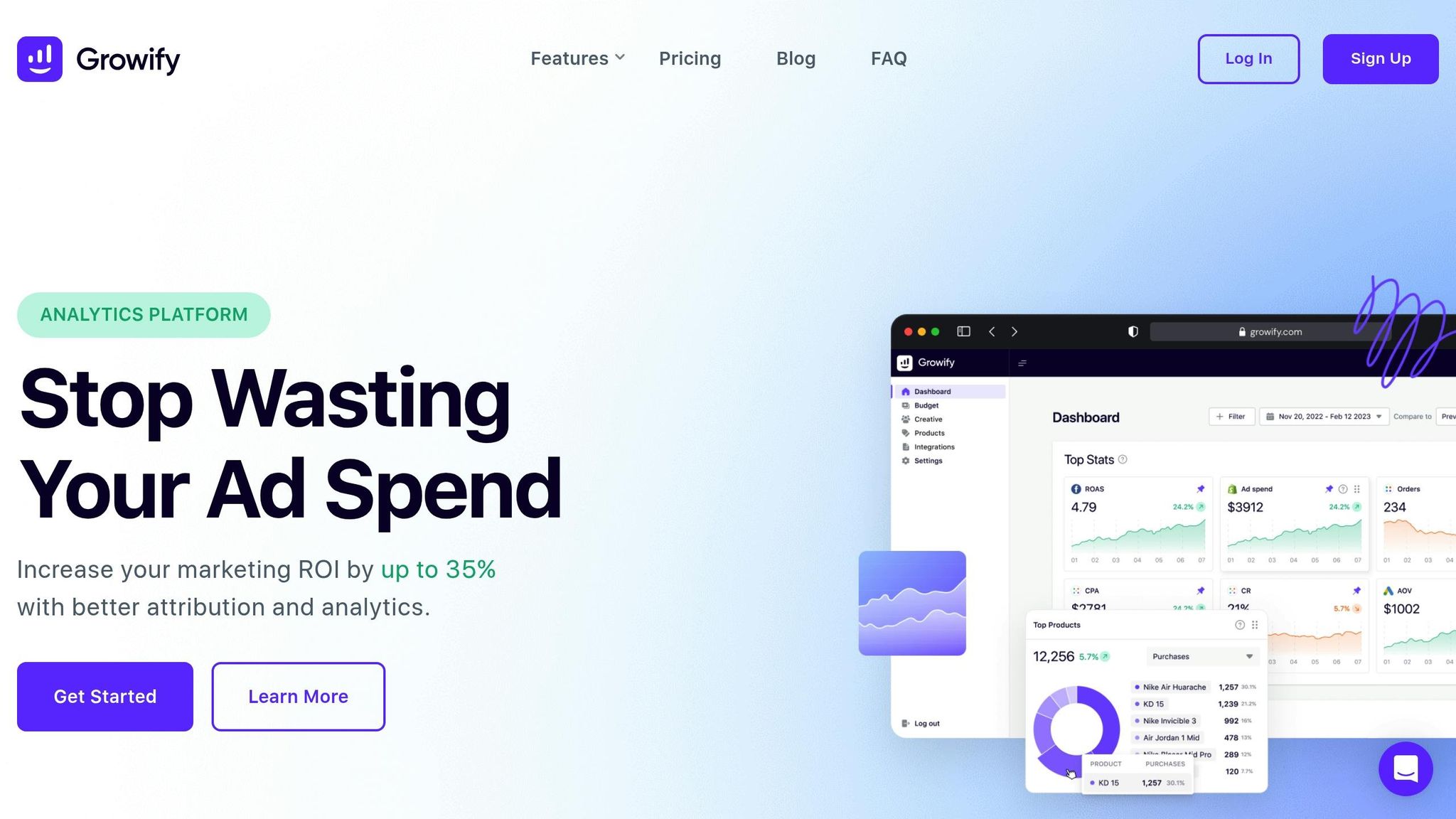
Growify is an AI-powered marketing reporting platform designed to streamline reporting for agencies and in-house marketing teams. With a focus on automation and flexibility, it caters to the diverse needs of US-based agencies managing multiple client portfolios.
Automated Data Integration
Growify simplifies the reporting process by integrating with major marketing platforms like Google Analytics, Facebook Ads, and various e-commerce tools. By automating data cleansing and blending, it reduces reporting time by up to 60% and improves data accuracy by 30%. This automated workflow ensures a smooth data pipeline, enabling teams to focus on analysis rather than manual data handling.
Customizable Dashboards
The platform offers highly adaptable dashboards that can be tailored to specific roles and branding requirements. Marketing managers can create high-level summaries for executives while still accessing detailed campaign metrics for operational insights. Agencies also benefit from white-label features, allowing them to present polished, branded reports that highlight key performance indicators relevant to their clients.
AI-Powered Insights
Growify’s AI capabilities take reporting to the next level by identifying trends, spotting anomalies, and suggesting optimization strategies. The platform can flag underperforming campaigns, recommend budget adjustments, and even forecast future performance based on historical data. For example, one mid-sized US agency used Growify to cut reporting time by 60%, uncover a 15% overspend, and reallocate budgets to achieve a 20% increase in ROI within just one quarter.
US-Specific Localization
Growify ensures compliance with US regulations, including CCPA, to help organizations handle data responsibly and meet local legal standards.
With a 4.5/5 rating on leading software review platforms, Growify offers tiered pricing starting at $49 per month. This makes it an appealing option for smaller agencies while still delivering advanced tools for larger teams.
4. HubSpot Marketing Hub
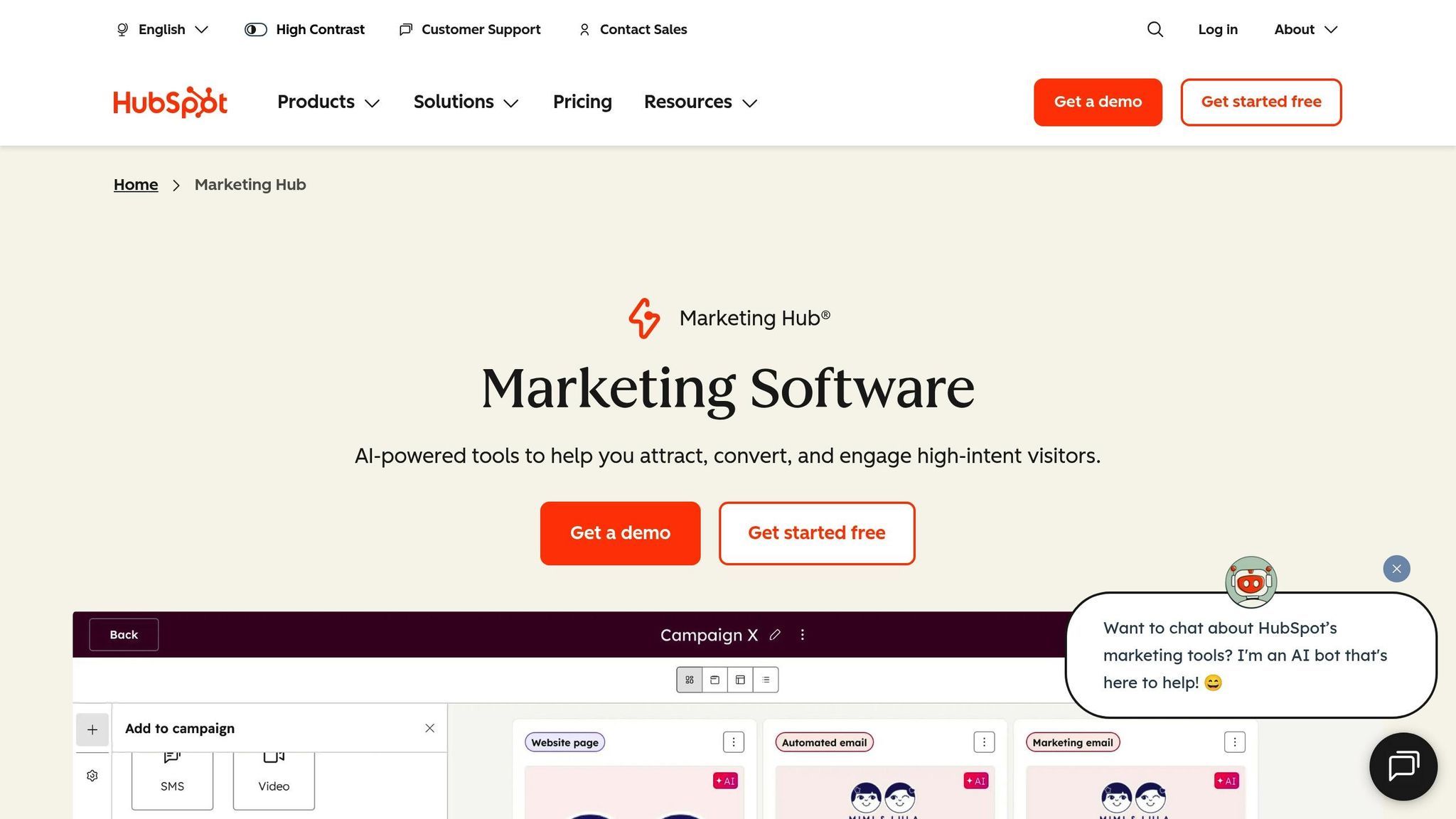
HubSpot Marketing Hub has become a go-to platform for marketing teams worldwide, with over 167,000 businesses relying on it for its AI-driven features and advanced reporting tools. Its reputation as a trusted marketing solution stems from its ability to combine powerful integrations, flexible dashboards, and actionable insights.
Automated Data Integration
One of the standout features of HubSpot Marketing Hub is how it brings all your marketing data together. By connecting seamlessly with major platforms like Google Ads, Facebook, and various CRM systems, it eliminates the need for manual data entry. For example, U.S. agencies can link HubSpot to these platforms to consolidate campaign spending, lead data, and sales outcomes in one real-time dashboard. This integration not only saves time but also ensures that all your data is in one place, ready for analysis.
Customizable Dashboards
HubSpot’s dashboards are designed to be as flexible as your marketing needs. You can use widgets, drag-and-drop modules, or pre-built templates to create reports that focus on the metrics that matter most - like lead generation, conversion rates, and campaign performance. For businesses in the U.S., the platform automatically formats data to fit local standards, such as displaying currency in U.S. dollars ($) and dates in MM/DD/YYYY format. Plus, you can filter data by specific time frames, segment audiences, or even add custom branding to your reports for a professional touch.
AI-Powered Insights
HubSpot doesn’t just collect data - it helps you make sense of it. The platform uses AI to identify trends, predict campaign outcomes, and suggest ways to improve performance. Features like predictive lead scoring and content optimization tips allow marketers to focus on high-impact opportunities. In fact, a 2025 independent review found that users saw a 22% boost in campaign efficiency after adopting HubSpot’s AI-powered reporting tools.
US-Specific Localization
HubSpot goes the extra mile to cater to U.S. businesses. From formatting data in U.S. dollars and imperial units to ensuring compliance with privacy regulations like CCPA, the platform aligns perfectly with American standards. It also provides secure data storage, user access controls, and audit trails. To further support U.S. users, HubSpot offers extensive training materials and a dedicated U.S.-based support team to assist with onboarding and troubleshooting.
Starting at just $20 per month for the Starter plan, HubSpot Marketing Hub has earned a 4.5/5 rating on major review platforms in 2025. Users frequently highlight its ease of use, strong integrations, and actionable AI-driven insights. Its combination of integration, customization, and localized support makes it a standout choice for marketing teams.
sbb-itb-daf5303
5. Zoho Analytics
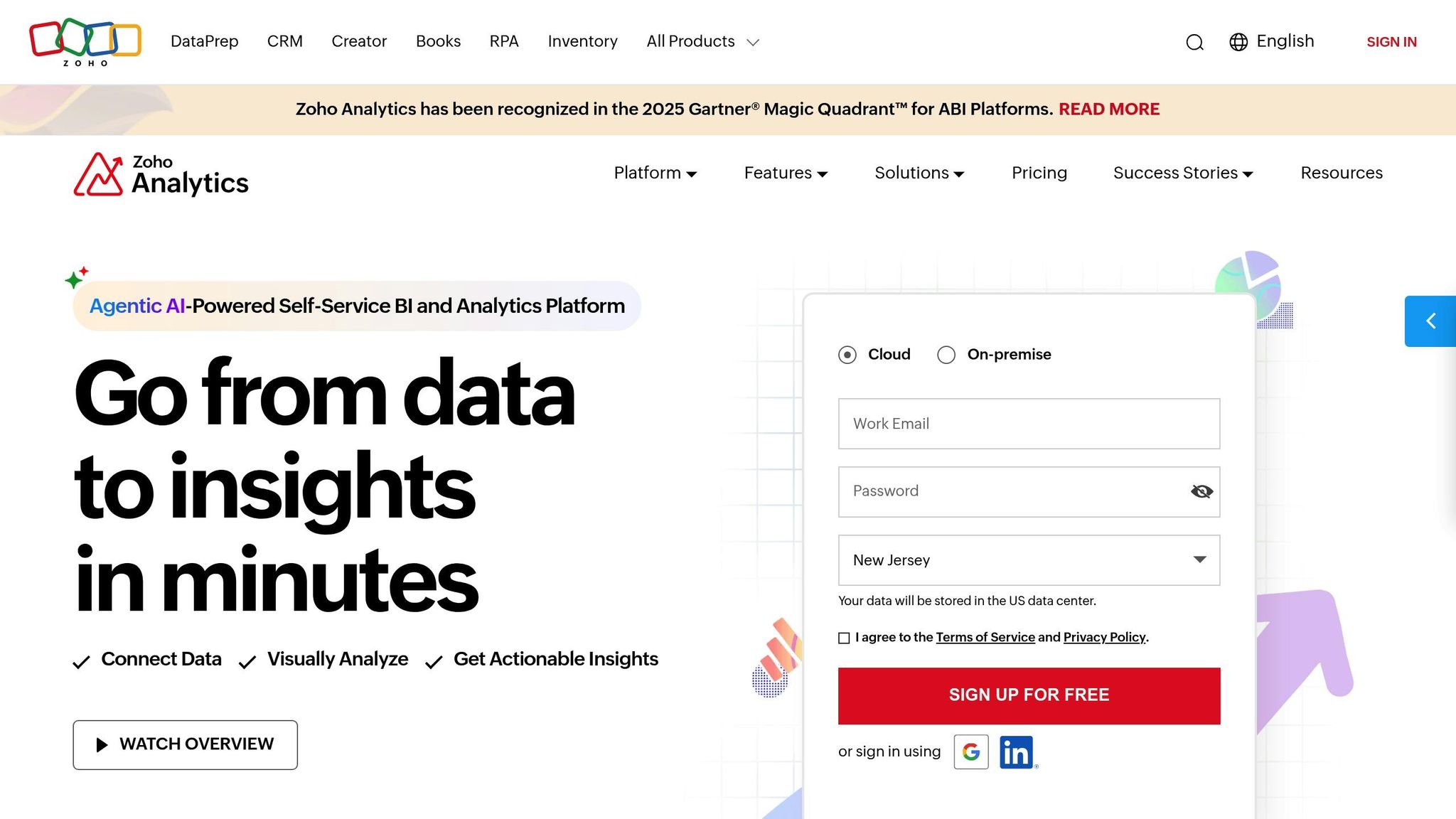
Zoho Analytics is a business intelligence platform packed with over 250 data connectors and competitively priced plans. Starting at just $25 per month for the Basic plan, it's a practical choice for U.S. marketing teams aiming to streamline their reporting processes.
Automated Data Integration
Zoho Analytics simplifies data integration by connecting effortlessly with tools like Google Ads, Facebook, HubSpot, Salesforce, and many more. With automated and scheduled data syncing, your reports always stay up-to-date. For example, one U.S.-based agency used Zoho Analytics to automate weekly performance reports for over 20 clients by integrating data from Google Ads, Facebook, and its CRM. This saved them countless hours of manual work while ensuring consistent and reliable reporting. Such automation provides a strong foundation for creating tailored visual reports.
Customizable Dashboards
Building on its seamless integrations, Zoho Analytics offers advanced customization for dashboards. You can design visualizations that align with your team's needs, incorporating company branding like logos and color schemes. Dashboards can be filtered by region, campaign, or time period, making it easy to track specific U.S. marketing KPIs. Reports can be shared in various formats, such as PDF, Excel, or live web links, ensuring stakeholders can access critical insights whether they're in a boardroom or on the go.
AI-Powered Insights
Zoho Analytics includes an AI assistant that responds to natural language queries. For instance, you can ask, "Which campaign had the highest ROI last quarter?" and get instant, data-backed answers. The platform also detects anomalies automatically, flagging unusual trends in campaign performance before they become costly. In one case, using these AI insights to identify underperforming ad sets helped a team boost overall campaign ROI by 15% in just two months. These tools empower marketers to make quick, informed decisions.
U.S.-Specific Localization
Zoho Analytics is tailored to meet U.S. business standards. It formats currency in U.S. dollars, dates in MM/DD/YYYY, and numbers with comma separators, ensuring reports align with American conventions. The platform also complies with U.S. data privacy regulations like CCPA, offering features such as role-based access control, data encryption, and detailed audit logs. These localization features ensure the platform meets the expectations of U.S.-based teams and clients.
Zoho Analytics offers a free plan for smaller datasets, making it accessible to businesses of all sizes. As your needs expand, the platform scales with you, combining powerful AI tools, extensive integrations, and affordable pricing. While some users mention a learning curve with its advanced features, many U.S. marketers praise its ability to transform reporting workflows effectively.
6. Akkio
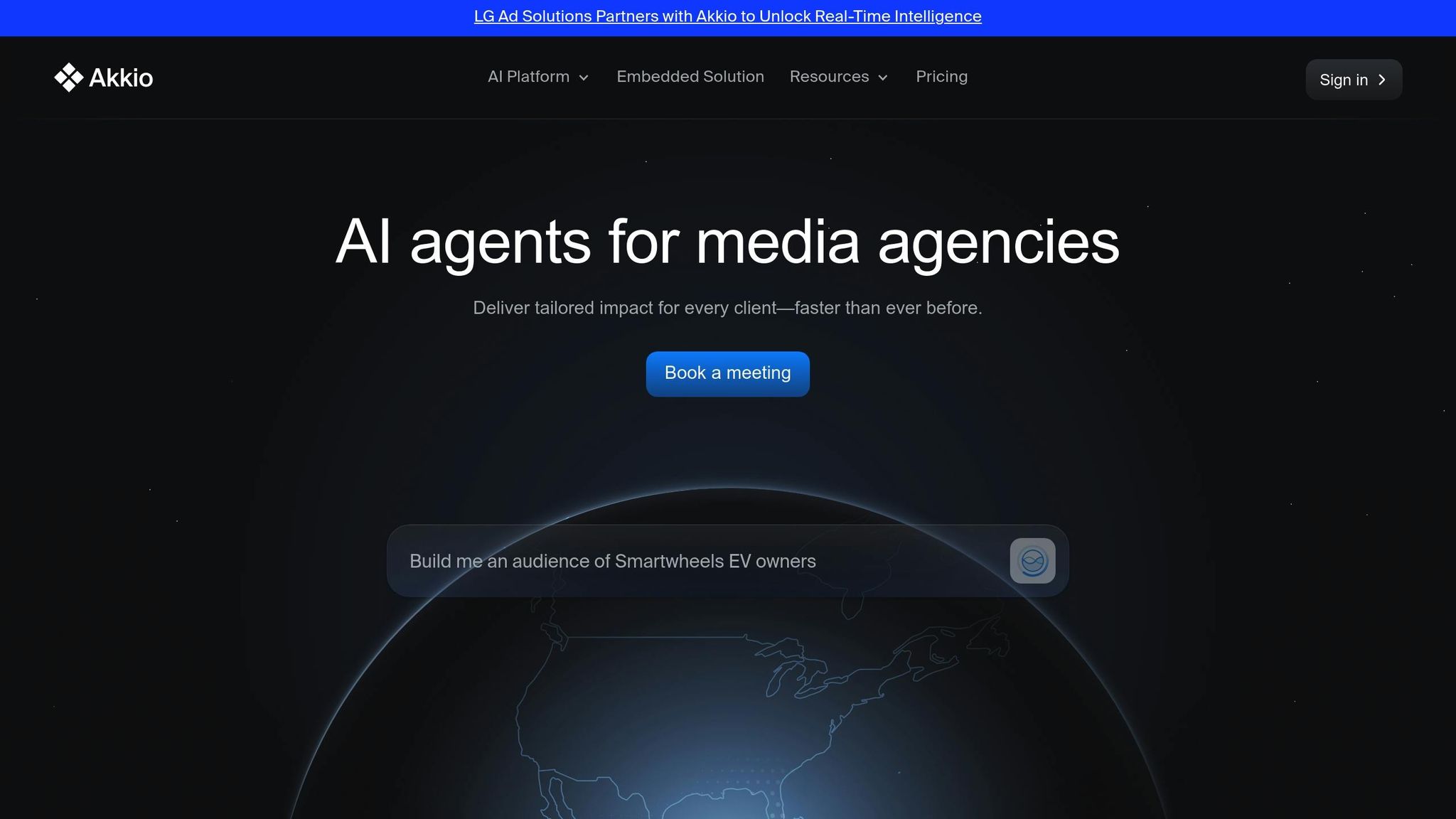
Akkio is an AI-powered analytics tool designed to simplify data integration, create customizable dashboards, and provide actionable insights for marketing teams. Starting at $49 per month, with a free trial available, it’s aimed at small teams looking to dive into predictive analytics without needing technical expertise.
Automated Data Integration
Akkio connects effortlessly with popular tools like Google Sheets, Salesforce, HubSpot, and Facebook Ads. It automates the data preparation process, taking care of the tedious task of cleaning and standardizing data from various sources. Marketing teams have reported cutting their manual reporting time by 80% after adopting Akkio’s workflows. This efficiency allows agencies to focus more on strategic planning rather than getting bogged down by data management.
Customizable Dashboards
With Akkio, building predictive models and dashboards doesn’t require coding skills. The user-friendly interface enables marketers to create reports tailored to different stakeholders. This ensures that every audience gets the metrics that matter most to them. Teams can also adapt their dashboards quickly to reflect campaign updates or meet client-specific needs, keeping their reporting flexible and relevant.
AI-Powered Insights
Akkio uses machine learning to uncover patterns and trends in marketing data. It can forecast campaign outcomes and offer optimization tips. On average, users have seen a 30% boost in campaign ROI after using Akkio’s AI-driven recommendations. The platform continuously learns from the data, identifying underperforming campaigns and suggesting ways to reallocate budgets for better results.
U.S.-Specific Localization
Akkio is designed with U.S. businesses in mind, formatting financial data in dollars and using the MM/DD/YYYY date format commonly used in the U.S. Reports also include comma separators for thousands, ensuring they meet American formatting standards. Additionally, Akkio complies with U.S. data privacy laws, making it a reliable choice for agencies handling sensitive client data.
With a 4.7/5 rating on major software review sites, users often highlight Akkio’s intuitive design and quick setup. While it may lack some advanced customization features found in enterprise-level tools, most users appreciate its simplicity and ability to deliver insights quickly and effectively.
Platform Strengths and Weaknesses
To help you make an informed choice, here's a breakdown of the key strengths and weaknesses of each platform. Every AI reporting tool has its own advantages and trade-offs, so it's important to weigh these factors based on your specific requirements.
Whatagraph is ideal for agencies managing multiple clients, thanks to its unified data preparation and white-labeling features. Its AI chatbot delivers concise summaries and actionable insights, cutting down on manual analysis time. US-based users benefit from 1-minute live chat support and dedicated Customer Success Managers. On the downside, the custom pricing model - based on data source credits - can become costly for smaller teams. Additionally, its heavy focus on e-commerce and ad-related use cases might not align with all marketing strategies.
AgencyAnalytics shines with its 80+ data source integrations, making it a strong choice for US PPC and SEO agencies. Its Ask AI feature and dashboard analysis tools offer accessible insights for non-technical users. While it’s praised for ease of use and client portal functionality, some users report occasional lags in real-time data updates and find the advanced customization options limited for complex enterprise needs.
HubSpot Marketing Hub takes an all-in-one approach, combining CRM integration with marketing automation and analytics. It’s particularly reliable for US businesses handling sensitive data, as it adheres to both CCPA and GDPR compliance standards. Extensive US-based support and training resources help teams adapt quickly. However, scaling costs can grow significantly, and the platform comes with a steeper learning curve for beginners.
Zoho Analytics is a budget-friendly option for small to mid-sized US businesses, offering competitive pricing starting at $24 per month. It features strong data visualization tools and integrates seamlessly with other Zoho products. US users benefit from dedicated support and documentation. That said, advanced features may require more technical setup, and the platform lacks some of the deeper marketing-specific integrations found in specialized tools.
Akkio focuses on accessibility for non-technical users with its no-code interface. Starting at $49 per month, it delivers quick automation capabilities and boasts a 30% average ROI boost. Its simplicity and ease of deployment make it appealing for teams looking for fast results. However, it offers fewer deep integrations with niche US marketing tools and lacks the customization options available in enterprise-level platforms.
Here’s a quick comparison of the platforms:
| Platform | Key Strengths | Main Weaknesses | Best Fit |
|---|---|---|---|
| Whatagraph | Unified data prep, AI summaries, white-labeling, fast support | Custom pricing, e-commerce focus | Medium-large agencies, multi-client reporting |
| AgencyAnalytics | 80+ integrations, Ask AI, client portals, easy to use | Real-time data lags, limited customization | Small-mid agencies, PPC/SEO focus |
| HubSpot Marketing Hub | All-in-one CRM, US compliance, strong support | High costs, steep learning curve | Inbound marketing, automation teams |
| Zoho Analytics | Affordable at $24/month, great visualization, Zoho integration | Requires technical setup, fewer marketing integrations | SMBs, Zoho ecosystem users |
| Akkio | No-code AI, $49/month, quick ROI | Limited niche integrations, less enterprise depth | Teams seeking fast insights, predictive analytics |
For US marketers, choosing the right platform depends on balancing cost, complexity, and the specific features your team needs. Agencies managing multiple clients often prefer Whatagraph or AgencyAnalytics, while businesses looking for comprehensive marketing automation lean toward HubSpot Marketing Hub. Budget-conscious teams may find Zoho Analytics appealing, and those prioritizing AI-driven insights without technical hurdles tend to favor Akkio.
Pick the platform that aligns best with your goals and resources.
Final Recommendations
Choose a platform that aligns with your specific needs and goals.
For medium to large agencies, Whatagraph is a standout choice. It combines unified data integration with AI-generated summaries and offers fast, live support to streamline your reporting process. That said, smaller teams should carefully evaluate if the pricing fits their budget.
Small to mid-sized agencies might prefer AgencyAnalytics. With over 80 data integrations and its handy "Ask AI" feature, it simplifies PPC and SEO reporting, making it a strong contender for agencies in this range.
Budget-conscious businesses should take a closer look at Zoho Analytics. Priced at $24 per month, it offers robust data visualization tools and white-labeling options, making it a cost-effective choice for smaller teams.
Companies focused on marketing automation will find HubSpot Marketing Hub a powerful option. It combines integrated CRM capabilities with detailed analytics to deliver a seamless automation experience.
For teams prioritizing user-friendly AI insights, Akkio is worth exploring. Starting at $49 per month, it provides accessible predictive analytics, making it a great fit for businesses looking to leverage AI without a steep learning curve.
When choosing a platform, think about your most pressing challenges. If manual reporting feels like a time sink, automation should be your priority. If impressing clients with polished presentations is critical, opt for tools with strong white-labeling and customization features. And if data integration is your sticking point, look for platforms that offer extensive connectivity.
For businesses struggling with manual reporting, custom AI solutions might be the answer. Hello Operator provides on-demand AI marketing specialists and tailored AI tools to meet your unique needs.
Remember, success isn’t just about picking the right platform - it’s about implementation. Make sure your team has access to proper training resources, start small with a pilot program, and set realistic expectations for the learning curve. Many platforms offer free trials, so use them to test real-world scenarios with your actual data before committing.
These recommendations can help you align your reporting strategy with your current challenges. As AI reporting tools continue to advance, choose vendors that can grow and adapt alongside your business.
FAQs
How can AI reporting platforms improve marketing team decisions?
AI reporting platforms, such as those offered by Hello Operator, empower marketing teams to make better decisions by automating the often time-consuming process of data analysis. These tools go beyond just crunching numbers - they provide actionable insights that can directly inform strategies across areas like SEO, content planning, and social media management. This allows teams to focus their energy on creative and strategic tasks instead of getting bogged down in manual data work.
By simplifying workflows and boosting efficiency, these platforms also help create an environment where AI becomes a natural part of the organization's operations. This integration encourages teams to embrace technology and thrive in today’s fast-evolving, tech-driven marketing world.
What should businesses look for in an AI reporting platform?
When selecting an AI reporting platform, it’s important for businesses to prioritize a solution that fits their unique goals and day-to-day processes. Look for features like seamless integration with existing tools, flexible customization options, and automation capabilities to handle repetitive tasks efficiently.
Hello Operator stands out by offering on-demand AI marketing expertise and tailored AI solutions designed to elevate digital marketing strategies. Their approach combines advanced technology with human creativity to simplify workflows, improve productivity, and encourage a collaborative, AI-focused work environment.
Can AI reporting platforms be customized for businesses of different sizes or industries?
AI reporting platforms are versatile enough to meet the specific needs of businesses, regardless of their size or industry. These tools can align with a company’s unique goals, whether it's automating routine tasks, diving into complex data analysis, or refining marketing strategies.
For instance, businesses can use tailored AI solutions to simplify operations, boost productivity, and ensure their tools are aligned with their objectives. Many platforms also provide workshops to help teams develop new skills, making it easier to integrate AI into current workflows without disruption.

